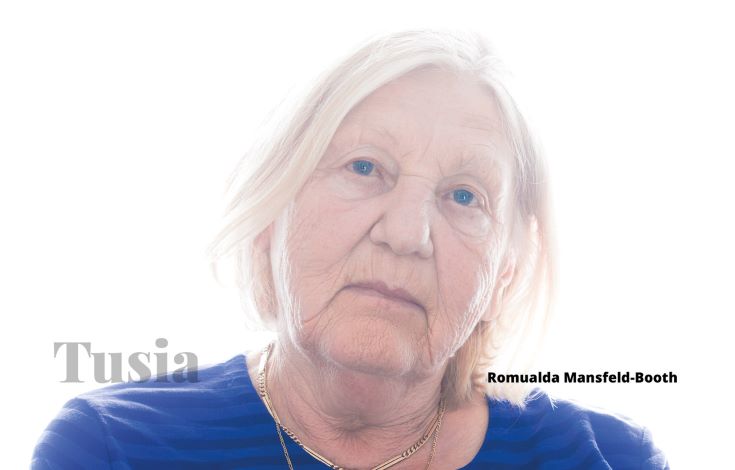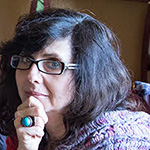Part 2: Courageous Rescues, Difficult Reunions: Heartbreaking Decisions by Parents during the Holocaust
June 9, 2021
By Joanna Beata Michlic
Editor’s Note: This blog comes from a lecture delivered at the International Seminar, Holocaust Education in the 21st Century: International Perspective, in recognition of the 25th of Yad Layeled, Ghetto Fighters’ House Museum, May 2, 2021. It is serialized in four parts.
Esther Goldynsztajn/Romualda Mansfeld-Boot and Maria Titarenko
The late Romualda Mansfeld-Boot, born at the end of 1939 as Esther Goldynsztajn (Goldstein) learned only in 1989 as a mature woman that her biological mother Helena Goldynsztajn (née Bohm) (1919-77) searched for her in vain through towns and villages in Volhyn, (today, Ukraine) for almost two years at the end of the Second World War.
In great anguish, Helena explored all possible options in search for her daughter: she was even hired as a nurse in one of the hospitals in the post-1945 Volhyn region, hoping that she would come across her daughter on a children's ward. The Germans killed the Polish railway-man to whom Helena had entrusted her blue-eyed and blonde-haired toddler daughter Esther/Romualda sometime in the first half of 1943. With his death, Helena (known later as Lena) could not retrieve the next traces of her young daughter's wartime and early postwar existence. She died in Israel in 1977, not knowing that her daughter from her first marriage was alive and living in Toruń, a charming medieval city in north-central Poland.
Romualda discovered the names of her biological parents and some sketchy details of her wartime history in 1989. Only then, she learned that after the death of her father Jakub Goldynsztajn in the Bełżec extermination center in eastern Poland, her mother pregnant with a second child, and with Romualda escaped the Brody ghetto to the Aryan side. This took place sometime in the early spring of 1943 before the final liquidation of the Brody ghetto in May 1943. Romuald's mother managed to safeguard a shelter for her daughter on the Aryan side before she went into hiding with other members of her husband’s family in a bunker prepared by her rescuer, a local Ukrainian man. A mixed Polish-Ukrainian and childless couple, Maria Titarenko née Kucharska and Mikołaj Titarenko took care of Romualda sometime around the Easter holiday of 1943.
After the war, the couple became her official adoptive parents. In her interview conducted for the poignant, 2015 exhibition about Jewish child survivors in Poland and their perished, known and unknown Jewish parents and adoptive Polish parents, Romualda, then a member of the Association of Jewish Child Survivors in Poland, recalls fragmentary vignettes of her postwar life and reflects about the complexities of her life as a child survivor. In early 1946, with her emotionally cold and strict Polish mother Maria, she embarked on a new life journey to Żary near Żagań in Silesia in the first repatriation transport from the East ( Kresy) where she was born. Mikołaj, the baker whom Romualda recalls as a warm and caring father, joined them in Żary later that year.
"Mother wandered around Wołyń (Volhyn) for a year and a half, combing through towns and villages, while I was then in the Recovered Territories (Ziemie Odzyskane, Poland). I had new personal data, I did not figure on any list of recovered people, therefore my mother could not find me. Certain that I had perished, she decided to leave for Israel. On the way there, she got to know her second husband. She had two sons (Eli Ramon) with him. After many years, in 1989, I managed to find them thanks to genetic tests. Unfortunately, my mother did not live to witness that. It was not given for us to meet."
 In a 2018 video interview for the memory project, Zapis Pamięci" created by the members of the Association of Child Holocaust Survivors and their children, members of the Second Generation in Poland, Romualda speaks with sadness about her own lack of memories of and knowledge about any Jewish organizations searching for her as a young girl in the early postwar period. Her encounter of 1989 with Mr. Reihman, an Auschwitz survivor from Łódź and the second husband of her biological mother and her two half-biological brothers, the older one, Eli Ramon resembling closely Romualda, was a "miraculous moment" in her life. Yet, as she recalls with stoic resignation, she couldn't imagine moving to Israel and reshaping her entire life. Romualda's encounter with her half-brothers and other relatives in Israel was on many levels a life-changing experience, yet at the same time, her life has been fully rooted in Polish culture and the Polish social environment. Therefore, after the emotionally powerful three-month visit to Israel, she returned to Poland where she had lived her whole postwar life and created her own family.
In a 2018 video interview for the memory project, Zapis Pamięci" created by the members of the Association of Child Holocaust Survivors and their children, members of the Second Generation in Poland, Romualda speaks with sadness about her own lack of memories of and knowledge about any Jewish organizations searching for her as a young girl in the early postwar period. Her encounter of 1989 with Mr. Reihman, an Auschwitz survivor from Łódź and the second husband of her biological mother and her two half-biological brothers, the older one, Eli Ramon resembling closely Romualda, was a "miraculous moment" in her life. Yet, as she recalls with stoic resignation, she couldn't imagine moving to Israel and reshaping her entire life. Romualda's encounter with her half-brothers and other relatives in Israel was on many levels a life-changing experience, yet at the same time, her life has been fully rooted in Polish culture and the Polish social environment. Therefore, after the emotionally powerful three-month visit to Israel, she returned to Poland where she had lived her whole postwar life and created her own family.
Romualda's case shows that for child Holocaust survivors like her, it is too late at a mature adult age to rebuild close and strong emotional bonds with a newly discovered biological family because of the lack of such bonds in early years and the long passage of time since the Holocaust. The sheer bad luck that accompanied her biological mother Helena in her search for Romualda at the end of the war in Volhyn was decisive for the future fate and cultural identity of Romualda.
We know from various archival and oral history sources, that Helena was not the only surviving Jewish parent who did not retrieve her child in the aftermath of the Holocaust, in spite of tremendous efforts and years of searching for both the children and their rescuers. There were also Jewish parents in Poland (and also other countries) who successfully located the whereabouts of their surviving children after the war but were not reunited with them for a variety of reasons. This is another painful aspect of the postwar history of a Jewish family that begs for a full investigation and retelling.
 Joanna Beata Michlic is a social and cultural historian, and founder, and former director of HBI’s Legacy Project: The Project on Families, Children, and the Holocaust at Brandeis University. She is an Honorary Senior Research Associate at the University College London’s (UCL) Centre for the Study of Collective Violence, the Holocaust and Genocide, UCL Institute for Advanced Studies, and Research Fellow at Weiss-Livnat International Centre for Holocaust Research and Education, University of Haifa, June 2019-May 2022. She is also a Research Associate at HBI, and a co-editor in Chief of Genealogy Journal. Her research focuses on social and cultural history of Poland and East European Jews, the Holocaust and its memory in Europe, East European Jewish childhood, rescue and rescuers of Jews in East-Central Europe, and antisemitism, racism, and nationalism in Europe. She is a recipient of many prestigious academic awards and fellowships, most recently Gerda Henkel Fellowship, 2017-21.
Joanna Beata Michlic is a social and cultural historian, and founder, and former director of HBI’s Legacy Project: The Project on Families, Children, and the Holocaust at Brandeis University. She is an Honorary Senior Research Associate at the University College London’s (UCL) Centre for the Study of Collective Violence, the Holocaust and Genocide, UCL Institute for Advanced Studies, and Research Fellow at Weiss-Livnat International Centre for Holocaust Research and Education, University of Haifa, June 2019-May 2022. She is also a Research Associate at HBI, and a co-editor in Chief of Genealogy Journal. Her research focuses on social and cultural history of Poland and East European Jews, the Holocaust and its memory in Europe, East European Jewish childhood, rescue and rescuers of Jews in East-Central Europe, and antisemitism, racism, and nationalism in Europe. She is a recipient of many prestigious academic awards and fellowships, most recently Gerda Henkel Fellowship, 2017-21.
Sources
- Testimony of Romualda Mansfeld-Boot in "Moi żydowscy rodzice, moi polscy rodzice," an album accompanying the exhibition at the Museum of Polish Jews Polin Museum in Warsaw, in April 2015) published by the Association of Child Holocaust Survivors, 2015, 42.
- The 2018 video interview with Romualda Mansfeld-Boot, see the online memory project, Zapis Pamięci.